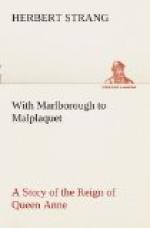At the same instant a fierce shout was heard, and George saw dashing to the spot one of the redoubtable Irish Brigade. Like lightning the young captain leapt from his horse, lifted Wilson from the ground, and by main strength threw him across the animal, crying, “Off with you!” giving the horse a thump with his fist on the quarters to start him into a gallop. Then, looking round, he found the Irishman bearing down upon him at desperate speed, and but a yard or two away.
In a trice Fairburn darted behind the trunk of a fine tree at his elbow. It was an oak, from which ran out some magnificent limbs parallel with and at a distance of six or eight feet from the ground. Nothing heeding, the Irishman kept on, his sword ready for a mighty stroke. Then instantly he was swept violently from his horse, and backwards over the tail, his chest having come into contact with one of the great boughs. All this had passed like a flash.
George made a grab at the bridle, but, missing it, fell sprawling to the ground. Springing up, he found his fallen antagonist risen and upon him. “English dog!” roared the Irishman, and the next moment the two men were at it, both excited, both reckless.
How long they fought they never knew. Apparently the spot was deserted save for themselves and sundry wounded who lay around. It was a desperate encounter. The Irishman had the advantage in height and strength, Fairburn in youth and activity. In the matter of swordsmanship there was little to choose between the two; in respect of courage nothing. It was to be a duel to the death.
The moments flew by, each man had received injuries, and the blood was flowing freely. Still the swords flashed in the air. Then suddenly the Irishman’s weapon snapped at the hilt, and the gallant fellow dropped at the same moment to the ground. Instantly George set his foot on the prostrate man’s chest, and cried, “Now your life is at my mercy! What say you?”
“If I must die, I must,” the Irishman answered doggedly, “but,” he added quickly, a sudden thought striking him, “take this first, and see it put into the hands of the person mentioned on it, sir.” The trooper pulled from his breast a piece of paper soiled and crumpled, and George, wondering much, took it at the man’s hands. His foot still on his fallen foe, Fairburn unfolded the dirty and tattered paper. It was the cover of a letter, and he read with staring eyes the address on it, “To Captain M. Blackett,—Dragoons.” The handwriting he well knew; it was that of Mary Blackett.
“Great Heaven!” the reader cried, “where did you get this?”
“It was given me by a poor fellow, an officer, who escaped from the big explosion at Tournai. He blundered by mistake into our lines, and our fellows were about to finish him—leastways one chap was, but I landed him one between his two eyes, and that stopped his game.”
“And you saved the Englishman’s life?”




